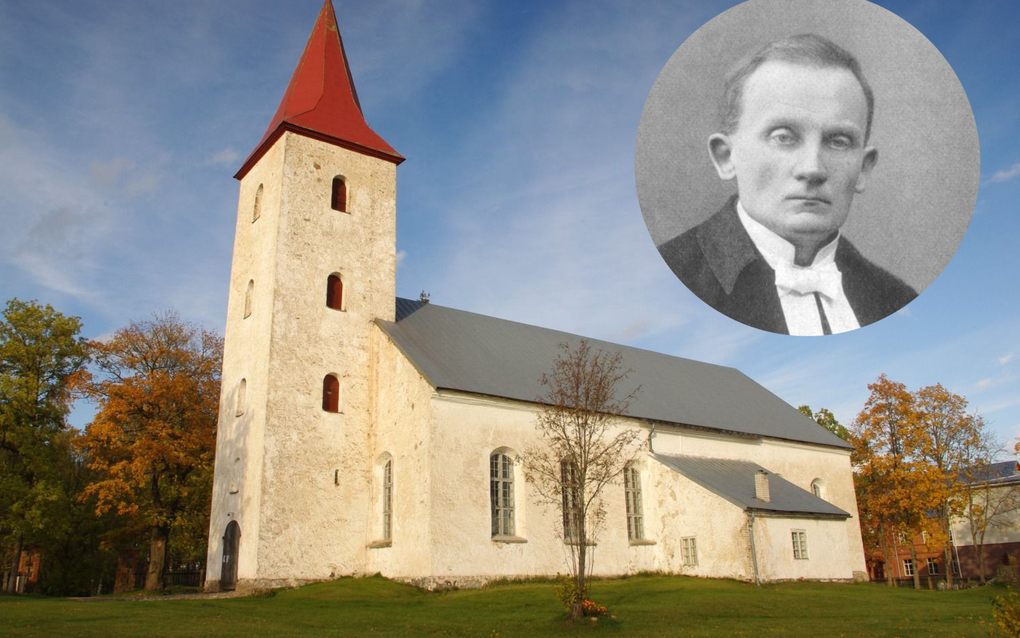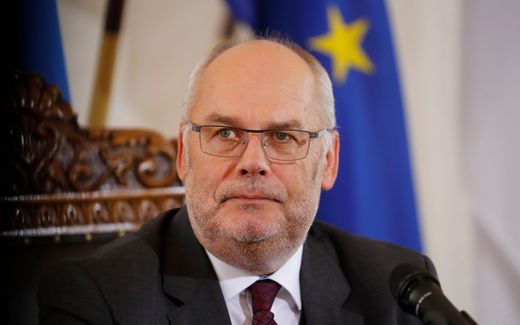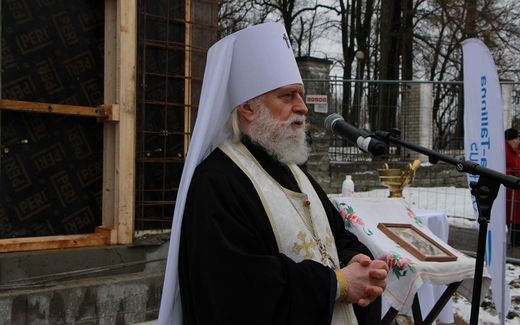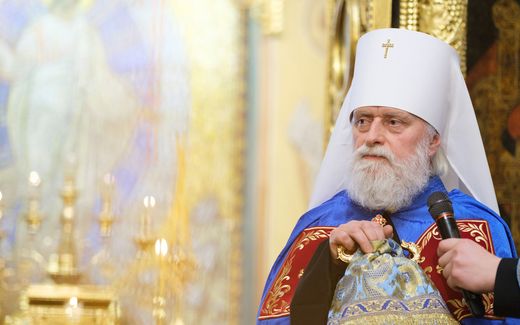Traugott Hahn, martyr of the Baltic church
14-01-2023
Eastern Europe
A.B. Goedhart, RD

Photo CNE
Eastern Europe
His name is not known to most of the public. Still, Traugott Hahn is considered one of the most famous martyrs of the Baltic church. On January 14th 1919, communist Bolsheviks killed the Lutheran pastor from Estonia.
The gifted Traugott Gotthilf Hahn was born on February 1st, 1875, as the eldest of nine children in the pastor's house in Rouge (Livland province), an Estonian rural village in an area of great natural beauty. Father Elieser, German by birth, was a denominational Lutheran pastor with a pietistic bent. He came from a preacher's family with much missionary love. Mother Rosalie used a wheelchair.
Rev Traugott Hahn
Rev Hahn was a pastor, preacher and spiritual leader who proclaimed a crucial spiritual message to his congregation members, catechists and students, which also had everything to say for everyday life: "Be reconciled to God!" There was with him a harmonious connection between personal piety and theological scholarship (reflection). This combination, by grace, granted him extraordinary radiating power. One of his goals was that a spiritual revival should be allowed to take place in the Lutheran people's church.
Hahn is mentioned in Estonia as the best-known martyr of the Baltic church.
The parents tried to live out the Christian faith through word and deed in this family. Father was a powerful personality with a strong faith, and mother was an example of self-denial, zeal and modesty. In the pastor's house, the children were home-schooled. In 1886 the family moved to Reval, where the father became pastor of St Olaf church.
Study
With his brother Willy, Traugott experienced difficult years at the grammar school in Reval due to the aggressive Russification of education. German students suffered much injustice and discrimination at the hands of the Russian rector during their school careers. For father Elieser, this prompted him to send his two sons to the St Petri school in the then-Russian capital St Petersburg.

In 1893, the Hahn brothers became theology students at the University of Dorpat (now Tartu). A year later, on November 8th, Willy died suddenly of typhoid fever. Spiritually deeply affected by this, Traugott interrupted his studies for a semester. On medical advice, he even spent some time in Switzerland because of weak health due to the heavy loss of a beloved brother.
After finishing his studies in Dorpat, his further scientific education required him to become a student at Göttingen University. At the end of 1899, however, Traugott had to abandon his academic studies to become an assistant preacher with his father, whose eyesight deteriorated. Two years later, Dorpat's university congregation appointed him as its preacher. He also received his doctorate in theology at Dorpat. His dissertation was entitled "Tyconius-studien". Tyconius was a contemporary of Augustine.
The doctorate also meant that he was simultaneously required to be a member of the theological faculty. But this process did not happen automatically. Professor of church history Kvacala strongly disliked Germans and Czechs. He did everything in his power, even during the promotion ceremony, to prevent Hahn from being promoted.
But all his attempts to boycott Hahn failed. In 1902, Hahn was admitted as a theological faculty member and lecturer. This was partly due to the cordial cooperation of Prof Dr A. Seeberg, Hahn's former teacher. This scientific authority had advocated Hahn's appointment with positive results.
On Saturday 29 August 1903, Traugott married Anny von zur Mühlen. She was the daughter of the director of the Estonian Adelsbank. Their wedding text was John 15:16 ("I have chosen you... and bear fruit..."). This text was once the bride's profession text. Their marriage was blessed with four children: Annemarie, Elisabeth, Wilhelm and Beate.
Professor
In Dorpat, the family experienced the first martyrdom of the Baltic church. It was the revolution of 1905, which in Estonia and Latvia targeted not only the possessing class but also the church and God's Word. Hahn was delighted that the Russian tsarist government ended the communist uprising. He was grateful for the religious and national freedom thus bestowed.
In early 1909, Hahn was appointed by the theological faculty to become a professor of practical theology. Again, Prof Kvacala tried to prevent this appointment. In the election, Hahn was three votes short of the required number. Still, he was appointed professor a year later by the Minister of Education.

In the spring of 1915, all expellees from the Livland region, including Hahn, were transported to the interior of Russia. But he was soon allowed to return. The Estonian and Latvian students' request to the war governor in Riga to recall Hahn as their esteemed teacher was successful. On the return journey, Hahn spoke to his father and brother-in-law in prison in St Petersburg before they were exiled to Siberia.
Hahn lectured again while the other German professors prepared their farewell lectures. This was possible because in 1916, by order of the Education Minister, lectures in practical theology had to be given in the Baltic languages, and Hahn mastered these. Other courses required teaching in Russian.
Revolution
The Russian Revolution of 1917 ushered in a time of complete arbitrariness and terror. On February 24th 1918, German soldiers liberated Dorpat. Hahn experienced this last, beautiful summer with his family in the rural village of Strandhof near Reval. On September 15th of that year, the university in Dorpat was reopened as a German college. When the German military retreated at the end of 1918, as "the red danger" of the Soviet Union drew ever closer and many fled, Rev Hahn remained with his congregation. On December 8th, he wrote to his brother Hugo, who was then pastor of the congregation of Nisse in northern Estonia: "I do not pass any judgment on your position. However, I tell you that I urgently wish God to make it possible for you to remain in your post. I fear for me and others that we will not be counted among them, of which John 10:13 (be not a hireling) speaks. I believe we have a lot to answer for before the King of the Church when we leave our station! If we are not willing to be His witness, even if it costs our lives, then we prove that the Gospel of Jesus Christ is not worth everything to us."
On the third Sunday of Advent in 1918, Rev Hahn preached on Rom. 14:7 and 8. His theme was "For Whom do we live and die?" He spoke: "He, Who is the sovereign Lord of martyrs, uses the death of His children as the most precious and fruitful seed for His Kingdom. Should primordial Christian martyrdom become our portion, we should not seek it. It comes down to facing suffering courageously by faith. Who can do that? However, one begs God for the courage of faith should it come to that."
On the eve of the German soldiers' departure for the homeland, Rev. Hahn received a visit from Reinold von Thadden. When Hahn said goodbye to this young German officer and former catechist, he said, "It may happen that even in our days, God again asks the heaviest sacrifice from us. The precious seed in the kingdom of God is to sacrifice your life to Him."
On the night before the fourth Sunday of Advent, the communist Bolsheviks in Dorpat seized all power. Immediately, they banned all church services. For this reason, Rev Hahn preached in the rectory and church members' homes. This also enabled him to comfort the grieving and offer pastoral help. In one house, he spoke after a tiring day: "If I have to die now, my staying has been rewarded anyway."
Murdered
On January 3rd 1919, Rev Hahn was arrested and taken to the Credit Bank. The ground floor of this building was used as a prison. One room had room for 20 people, but eighty were squeezed in, including Hahn. The interrogations were very brutal. Once, when Hahn had to wait a long time for food, he said, "I would rather suffer hunger than be without a Bible."

On January 14th, many prisoners were freed by an army of Estonians and Finns. Unfortunately, not all of them. Shortly before, some prisoners had been shot dead in the killing cellar, including Traugott Hahn - for his belief in Jesus Christ.
He was buried in the cemetery in Dorpat.
Sometime later, Hahn's widow moved to Germany. During the Nazi era, she had Rev Paul Schneider, the pastor of Buchenwald, on her intercessory note! Anny Hahn died in 1974.
Rev Traugott Hahn
Rev Hahn was a pastor, preacher and spiritual leader who proclaimed a crucial spiritual message to his congregation members, catechists and students, which also had everything to say for everyday life: "Be reconciled to God!" There was with him a harmonious connection between personal piety and theological scholarship (reflection). This combination, by grace, granted him extraordinary radiating power. One of his goals was that a spiritual revival should be allowed to take place in the Lutheran people's church.
Hahn is mentioned in Estonia as the best-known martyr of the Baltic church.
This article was translated by CNE.news and previously published in Dutch daily Reformatorisch Dagblad on January 13th, 2023.
Related Articles





